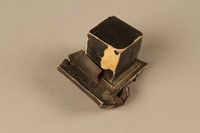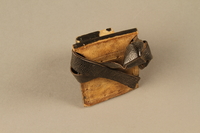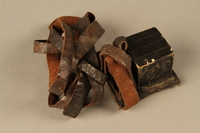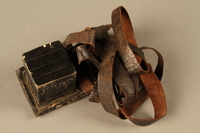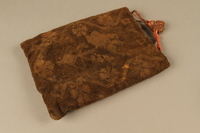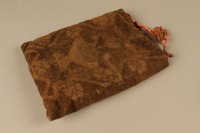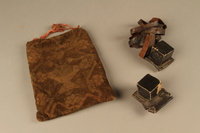Overview
- Brief Narrative
- A pair of tefillin and pouch, owned by Mihail Adler, and found in a drawer of the Adler family’s confiscated furniture in Kolozsvár, Hungary (now Cluj-Napoca, Romania), in 1946. A policeman named Grigore Patrascoiu helped Mihail and his son, Otto, find the furniture, which had been stored in the storage shed of a high-ranking Hungarian official. Prior to World War II, Hungary’s alliance with Nazi Germany enabled it to regain previously lost territory. Hungary annexed the northern half of Transylvania, and Cluj, Romania, became Kolozsvár, Hungary. Following the German occupation of Hungary in March 1944, Otto and his parents, Serena and Mihail, were forced to surrender their property and move into a Jewish ghetto in Kolozsvár’s brickyard. At the end of May, the family was deported to Auschwitz-Birkenau killing center in German-occupied Poland. After Otto falsified his age, he and Mihail were selected for forced labor. Serena was killed in the gas chambers. In late June, Otto and Mihail were deported to Longwy-Thil in German-occupied France, and later Kochendorf in Germany, both subcamps of Natzweiler concentration camp. In March 1945, Otto and Mihail were sent to Dachau concentration camp in Germany, which was evacuated in late April. As they were forced southward, Otto and Mihail were liberated by the U.S. Army in the area of the Garmisch-Partenkirchen concentration camp on May 1, 1945. The camp was transformed into a displaced persons (DP) camp and hospital, where Otto served as an official interpreter. In October 1945, Otto and his father returned to their former home and settled there.
- Date
-
use:
before 1944 May
recovered: 1946
- Geography
-
recovery:
Cluj-Napoca (Romania)
- Credit Line
- United States Holocaust Memorial Museum Collection, Gift of Otto Adler
- Contributor
-
Subject:
Otto Adler
Original owner: Mihail Adler
- Biography
-
Otto Adler (1929-2014) was born in Cluj (now Cluj-Napoca), Romania, to Isidor Mihail (1900-1959) and Serena (Szera, nee Fell, 1902-1944) Adler. Mihail was the son of Nuham and Ida Cohn Adler, and worked as a mechanical driver. Serena was the daughter of Matias and Sali Kraus Fell, and worked as a clerk. The family followed Orthodox religious practices. Otto began attending the Jewish primary school located in their synagogue in 1935. There, he learned several languages, including Hebrew, Romanian, Hungarian, French, and German. In the late 1930s, Hungary made an alliance with Nazi Germany that enabled it to regain territory lost after World War I. In August 1940, Axis powers Germany and Italy arbitrated a territory dispute between Romania and Hungary. The Second Vienna Award split the Transylvania region of Romania in half, and Hungary annexed the northern portion; Cluj became Kolozsvár. Almost immediately, the city’s approximately 17,000 Jews were subjected to Hungary’s existing antisemitic race laws, modeled after Germany’s Nuremburg Laws. These laws included forbidding intermarriage with non-Jews, exclusion from many professions, and restricted economic opportunities. Additionally, able-bodied males were conscripted into Hungarian forced labor battalions.
Germany occupied Hungary on March 19, 1944, bringing additional subjugation to Kolozsvár’s Jews. In April, they were compelled to wear a yellow Star of David on their clothing and forced to surrender their property. In May, Otto was forced to leave his Jewish middle school. His family moved into a ghetto in the Iris Brickyard. At its peak, the ghetto housed almost 18,000 Jewish people from Kolozsvár and surrounding communities. Between May 25 and June 9, six transports emptied the ghetto, deporting the inhabitants to Auschwitz-Birkenau killing center in German-occupied Poland. Upon arrival, older prisoners advised the younger ones to falsify their ages to avoid being sent to the gas chambers. Otto stated that he was two years older than he actually was, and both he and his father were selected for labor. Otto’s mother was separated from her son and husband for the women’s selection. Although she was initially selected for work, she switched herself to the other group of prisoners, with the mistaken hope she would be able to see her family again. Instead, she was taken to the gas chambers where she was killed.
On June 20, 1944, Otto and Mihail were among a transport of 500 Hungarian Jews selected by an engineer from Volkswagen sent to the Longwy-Thil subcamp of Natzweiler concentration camp, in German-occupied France. There, Otto received prisoner number 17661, and Mihail received number 17662. They were both put on a skilled worker list as auto mechanics, and worked underground in former mines. Thil used slave labor for underground construction, as well as missile and aircraft manufacture. The advancement of Allied forces caused the SS to evacuate the camp in September. Otto and Mihail were sent to Kochendorf, another Natzweiler subcamp in Germany. Prisoners at Kochendorf were forced to work in nearby underground armaments and jet engine factories, on construction projects, and labor deployments in the local community.
The liquidation of the camp began on March 28, 1945, when Otto and Mihail were included in a group of about 400 prisoners transferred by freight train to Dachau concentration camp, preceding a death march of 1,200-1,500 other prisoners. They arrived on April 2, and Otto was assigned prisoner number 148632, while Mihail was given number 148629. Within weeks, prisoners at Dachau were also ordered to evacuate. Otto and Mihail were part of the first evacuation transport to the subcamp Ötztal on April 23. On the way there, they were liberated by the U.S. Army in the area of the Garmisch-Partenkirchen concentration camp on May 1, 1945. All of the prisoners were very weak, and the camp was transformed into a displaced persons (DP) camp and hospital. While there, Otto served as an official interpreter for the army and the camp, speaking English, German, French, Romanian, and Hungarian. In September, Otto and Mihail were transferred to DP camp Feldafing.
In October 1945, Otto and his father returned to their former apartment in Cluj. The following year, a sympathetic policeman named Grigore Patrascoiu helped Otto and Mihail to find some of their furniture, which had been stored in the courtyard shed of a house belonging to a high-ranking Hungarian official. Along with the Adler’s furniture were other pieces confiscated from the city’s Jews. Otto returned to school in 1946. That summer, while at the Cojocna Resort, he met Lolita Abramovici, a Moldovan Jewish woman who had recently moved to Bucharest, Romania, with her family. Otto’s hometown was restored to Romania in 1947, and was once again known officially as Cluj. He completed his high school education in 1948, and from 1948-1952, Otto attended the University Politechnica in Bucharest. Otto and Lolita married in 1952, and he continued with his studies to earn an MA, and completed his PhD at the University Politechnica in 1963. Otto became a professor and researcher, and had two children with Lolita.
Physical Details
- Language
- Hebrew
- Classification
-
Jewish Art and Symbolism
- Category
-
Jewish ceremonial objects
- Object Type
-
Tefillin (lcsh)
- Genre/Form
- Ceremonial objects.
- Physical Description
- a, Hand tefillin with a square, black painted, leather box (batim) with smooth sides. The box is centered on a black painted, square, multi-layered leather platform, which is sewn together with gut from kosher animals (giddin). A short, black, leather strap (retzu’ot) with an unfinished underside is threaded through a triangular notch on the back of the platform. The box likely contains a parchment scroll (parshiyot) inscribed with four Hebrew prayers. The black paint on the sides of the box and edges of the platform have large areas of loss.
b. Head tefillin with a square, black painted, leather box (batim) constructed of four leather panels with an embossed Hebrew letter Shin on the left and right sides; the right Shin has four strokes, the left has three. The box is centered on a black painted, square, multi-layered leather platform sewn together with gut from kosher animals (giddin). A black leather strap (retzu’ot) with an unfinished underside is threaded through a triangular notch on the back of the platform. The black paint on the sides of the box and edges of the platform is chipped. The platform is stained on the bottom, warped, beginning to separate, and has disintegrating stitching.
c. Rectangular, brown velvet pouch with a floral design and lined with a tan, plain weave fabric. The design has been created by “voiding,” or removing portions of the pile or textured surface, leaving a perforated surface within the floral elements. Sewn around the top of the interior are 10 small, brass rings, through which the drawstring is threaded. The drawstring is made up of multiple strings of red and brown thread that is knotted and matted at the ends. On the exterior of the pouch, there are three small holes in the outer layer, revealing the lining. - Dimensions
- a: Height: 2.250 inches (5.715 cm) | Width: 2.875 inches (7.303 cm) | Depth: 2.250 inches (5.715 cm)
b: Height: 2.000 inches (5.08 cm) | Width: 2.250 inches (5.715 cm) | Depth: 2.375 inches (6.033 cm)
c: Height: 8.875 inches (22.543 cm) | Width: 6.875 inches (17.463 cm) | Depth: 1.125 inches (2.858 cm) - Materials
- a : leather, paint, gut, paper, ink
b : leather, paint, gut, paper, ink
c : cloth, thread, brass
Rights & Restrictions
- Conditions on Access
- No restrictions on access
- Conditions on Use
- No restrictions on use
Keywords & Subjects
- Topical Term
- Concentration camp inmates--Selection process. Detention of persons--Hungary. Faith (Judaism) Families. Forced labor--Germany. Gas chambers. Hungarians--Romania--Transylvania. Jewish property--Hungary. Jewish religious education of children. Race discrimination--Law and legislation--Hungary.
Administrative Notes
- Legal Status
- Permanent Collection
- Provenance
- The set of tefillin was donated to the United States Holocaust Memorial Museum in 2006 by Otto Adler, the son of Mihail Adler.
- Record last modified:
- 2023-08-25 18:01:52
- This page:
- https://collections.ushmm.org/search/catalog/irn549462
Download & Licensing
In-Person Research
- By Appointment
- Request 21 Days in Advance of Visit
- Plan a Research Visit
- Request to See This Object
Contact Us
Also in Adler family collection
The collection consists of sets of tefillin and Jewish prayer books, relating to the experiences of Otto Adler and his parents, Serena Fell Adler and Mihail Adler, in Romania and Poland during and after the Holocaust.
Date: 1940-1946
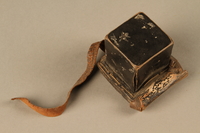
Pair of Tefillin and pouch owned by a Romanian Jewish concentration camp survivor
Object
A pair of tefillin and pouch inherited by Otto Adler from his grandfather, Nuham Adler, and found in a drawer of the Adler family’s confiscated furniture in Kolozsvár, Hungary (now Cluj-Napoca, Romania), in 1946. A policeman named Grigore Patrascoiu helped Otto and his father, Mihail, find the furniture, which had been stored in the storage shed of a high-ranking Hungarian official. Prior to World War II, Hungary’s alliance with Nazi Germany enabled it to regain previously lost territory. Hungary annexed the northern half of Transylvania, and Cluj, Romania, became Kolozsvár, Hungary. Following the German occupation of Hungary in March 1944, Otto and his parents, Serena and Mihail, were forced to surrender their property and move into a Jewish ghetto in Kolozsvár’s brickyard. At the end of May, the family was deported to Auschwitz-Birkenau killing center in German-occupied Poland. After Otto falsified his age, he and Mihail were selected for forced labor. Serena was killed in the gas chambers. In late June, Otto and Mihail were deported to Longwy-Thil in German-occupied France, and later Kochendorf in Germany, both subcamps of Natzweiler concentration camp. In March 1945, Otto and Mihail were sent to Dachau concentration camp in Germany, which was evacuated in late April. As they were forced southward, Otto and Mihail were liberated by the U.S. Army in the area of the Garmisch-Partenkirchen concentration camp on May 1, 1945. The camp was transformed into a displaced persons (DP) camp and hospital, where Otto served as an official interpreter. In October 1945, Otto and his father returned to their former home and settled there.
Hebrew prayer book, owned by a Romanian Jewish woman killed in a concentration camp
Object
Prayer book, Ünnepi Imádságok, owned by Otto Adler’s mother, Serena Fell Adler, and found in a drawer of the Adler family’s confiscated furniture in Kolozsvár, Hungary (now Cluj-Napoca, Romania), in 1946. A policeman named Grigore Patrascoiu helped Otto and his father, Mihail, find the furniture, which had been stored in the storage shed of a high-ranking Hungarian official. Prior to World War II, Hungary’s alliance with Nazi Germany enabled it to regain previously lost territory. Hungary annexed the northern half of Transylvania, and Cluj, Romania, became Kolozsvár, Hungary. Following the German occupation of Hungary in March 1944, Otto and his parents, Serena and Mihail, were forced to surrender their property and move into a Jewish ghetto in Kolozsvár’s brickyard. At the end of May, the family was deported to Auschwitz-Birkenau killing center in German-occupied Poland. After Otto falsified his age, he and Mihail were selected for forced labor. Serena was killed in the gas chambers. In late June, Otto and Mihail were deported to Longwy-Thil in German-occupied France, and later Kochendorf in Germany, both subcamps of Natzweiler concentration camp. In March 1945, Otto and Mihail were sent to Dachau concentration camp in Germany, which was evacuated in late April. As they were forced southward, Otto and Mihail were liberated by the U.S. Army in the area of the Garmisch-Partenkirchen concentration camp on May 1, 1945. The camp was transformed into a displaced persons (DP) camp and hospital, where Otto served as an official interpreter. In October 1945, Otto and his father returned to their former home and settled there.
Hebrew prayer book, owned by a Romanian Jewish woman killed in a concentration camp
Object
Prayer book, Ünnepi Imádságok, owned by Otto Adler’s mother, Serena Fell Adler, and found in a drawer of the Adler family’s confiscated furniture in Kolozsvár, Hungary (now Cluj-Napoca, Romania), in 1946. A policeman named Grigore Patrascoiu helped Otto and his father, Mihail, find the furniture, which had been stored in the storage shed of a high-ranking Hungarian official. Prior to World War II, Hungary’s alliance with Nazi Germany enabled it to regain previously lost territory. Hungary annexed the northern half of Transylvania, and Cluj, Romania, became Kolozsvár, Hungary. Following the German occupation of Hungary in March 1944, Otto and his parents, Serena and Mihail, were forced to surrender their property and move into a Jewish ghetto in Kolozsvár’s brickyard. At the end of May, the family was deported to Auschwitz-Birkenau killing center in German-occupied Poland. After Otto falsified his age, he and Mihail were selected for forced labor. Serena was killed in the gas chambers. In late June, Otto and Mihail were deported to Longwy-Thil in German-occupied France, and later Kochendorf in Germany, both subcamps of Natzweiler concentration camp. In March 1945, Otto and Mihail were sent to Dachau concentration camp in Germany, which was evacuated in late April. As they were forced southward, Otto and Mihail were liberated by the U.S. Army in the area of the Garmisch-Partenkirchen concentration camp on May 1, 1945. The camp was transformed into a displaced persons (DP) camp and hospital, where Otto served as an official interpreter. In October 1945, Otto and his father returned to their former home and settled there.
Hebrew prayer book, owned by a Romanian Jewish woman killed in a concentration camp
Object
Prayer book, Ünnepi Imádságok, owned by Otto Adler’s mother, Serena Fell Adler, and found in a drawer of the Adler family’s confiscated furniture in Kolozsvár, Hungary (now Cluj-Napoca, Romania), in 1946. A policeman named Grigore Patrascoiu helped Otto and his father, Mihail, find the furniture, which had been stored in the storage shed of a high-ranking Hungarian official. Prior to World War II, Hungary’s alliance with Nazi Germany enabled it to regain previously lost territory. Hungary annexed the northern half of Transylvania, and Cluj, Romania, became Kolozsvár, Hungary. Following the German occupation of Hungary in March 1944, Otto and his parents, Serena and Mihail, were forced to surrender their property and move into a Jewish ghetto in Kolozsvár’s brickyard. At the end of May, the family was deported to Auschwitz-Birkenau killing center in German-occupied Poland. After Otto falsified his age, he and Mihail were selected for forced labor. Serena was killed in the gas chambers. In late June, Otto and Mihail were deported to Longwy-Thil in German-occupied France, and later Kochendorf in Germany, both subcamps of Natzweiler concentration camp. In March 1945, Otto and Mihail were sent to Dachau concentration camp in Germany, which was evacuated in late April. As they were forced southward, Otto and Mihail were liberated by the U.S. Army in the area of the Garmisch-Partenkirchen concentration camp on May 1, 1945. The camp was transformed into a displaced persons (DP) camp and hospital, where Otto served as an official interpreter. In October 1945, Otto and his father returned to their former home and settled there.

